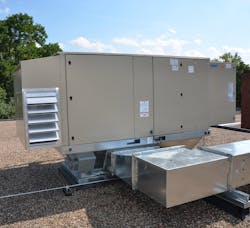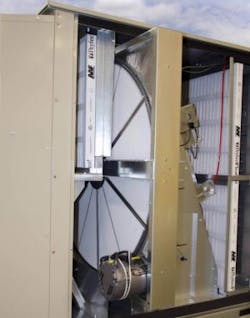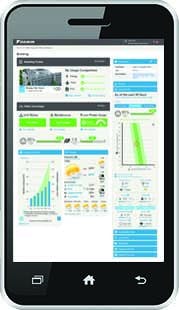Daikin Applied Brings Energy Efficiency, Improved Comfort Control to College Campus
Managing energy and sustainability, along with better comfort control, is becoming an essential part of daily operations for many large facilities. Entrusted by parents to keep students healthy and safe, schools and universities are among those specifically under pressure to provide good indoor air quality (IAQ) in occupied spaces, such as residence halls and classrooms.
Bethel University, a top-ranked university based in St. Paul, Minn., faced comfort and energy efficiency challenges in its residence halls with old, existing equipment. It was clear to university leadership the only option was replacing the original, nearly 40-year-old rooftop equipment in its two residence halls on the large campus. Yet, they wanted a system that would monitor conditions and report hourly IAQ levels.
The four-story Bodien residence hall sits on a hillside and is connected by a common student lounge to the three-story Edgren hall, creating a 52,720 sq. ft. campus-life complex. While the 20-year-old fan coils were keeping pace with dorm rooms, the older rooftops that supply dedicated outside air were unable to keep up with the demands of student life, showers and the variable Minnesota climate.
Because the outdated equipment was not working effectively, it was extremely important to the university to actively manage their use of energy, not only for budget reasons, but also to ensure the comfort of the students, not to mention their commitment to sustainability.
“One of the driving forces to replace the old units was trying to get better ventilation, drier air and make it more comfortable inside the dorm rooms,” said Chuck Broz, HVAC technician supervisor at Bethel University.
So the university could take advantage of direct expansion (DX) technology and avoid high chilled water use from its central chiller plants, it chose to replace the existing equipment with Rebel rooftop units from Daikin Applied.
“One of the biggest reasons we selected the Rebel units was to get, from the DX side, significant efficiency while being able to put in the reheat air with very little moisture content,” Broz said.
Installation of the units was staged to meet the university’s budget and tight timelines to accommodate student life schedules. The units were installed in August 2013, August 2014 and March 2015, when dorms weren’t occupied.
In order to measure the system’s effectiveness, Daikin Applied’s Intelligent Equipment™ was installed in two of the rooftop units – one on each building. The only Internet of Things enabled control solution, Intelligent Equipment delivers the real-time data Broz’s team demanded to benchmark performance and monitor system operation.
“Our energy managers use Intelligent Equipment to gather data, and we use it to see the detail of operational data and monitor the units. We appreciate that we can connect remotely to the units on a laptop or smartphone,” Broz said.
As a result, Bethel University administrators and its students are experiencing a higher level of comfort—and the savings are helping the university manage costs.
The difference in humidity levels across the two buildings was dramatic in the early operation of the new rooftop units in one residence hall versus the other that still operated with the original rooftop equipment. “We’ve maintained everything below 55% humidity with the new unit. With our existing equipment, we were well over 80% humidity throughout the building space, even with the fan coils in the dorm rooms, because various doors are left open,” Broz said.
Inverter compressor technology allows for low audible output and a quiet environment, enhancing students’ studying and living conditions. In fact, one of the upsides of the new system is that the quiet, unimpeded operation goes unnoticed by students.
The energy savings are significant, as a result of reduced natural gas consumption and less reliance on the chiller plants that serve the complex, as well as the lower electrical consumption of the new versus existing rooftops. Notably, energy recovery technology, which heats up outside air, provides significant energy savings, especially during Minnesota’s cold winter months.
“In the winter, we’ll use Intelligent Equipment to look at the energy side to optimize use of the energy wheels instead of using building heat, especially as it relates to the restrooms and showers. In the summer, we use it to see if we’re doing an effective job of keeping the dew point and humidity at low levels,” Broz said.
The value of Daikin Applied’s Intelligent Equipment technology platform impacts all levels of how HVAC equipment is controlled and maintained. It moves users from a reactive to a proactive model, in order to quickly adjust ineffective systems and help facility managers maintain equipment before it loses efficiency or impacts occupant comfort. This sort of system is a viable alternative to traditional building automation systems – and at a fraction of the cost.
Bethel University has been so satisfied with their three Rebel units that they ordered and recently received a four-ton Rebel rooftop unit to serve its new, state-of-the-art Wellness Center that houses its fitness center and exercise science program, opening fall 2015.


